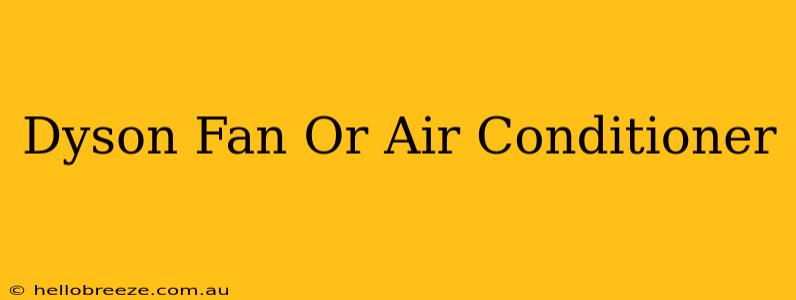Summer's heat can be brutal, leaving you searching for relief. Two popular choices often top the list: Dyson fans and air conditioners. But which one reigns supreme? This in-depth comparison will help you decide which is the best fit for your needs and budget.
Understanding Your Cooling Needs
Before diving into the specifics of Dyson fans and air conditioners, it's crucial to understand your cooling requirements. Consider these factors:
- Climate: Do you live in an area with mild summers or scorching heat? A Dyson fan might suffice for milder climates, while an air conditioner is necessary for extreme heat.
- Budget: Air conditioners generally have a higher upfront cost than Dyson fans. Consider your budget and whether you're willing to invest in a more expensive, long-term solution.
- Space: Air conditioners require space for installation and can take up valuable floor or window space. Dyson fans are more portable and compact.
- Energy Consumption: Both air conditioners and Dyson fans consume energy, but air conditioners typically use significantly more. Consider your energy bills and environmental impact.
Dyson Fans: A Closer Look
Dyson fans, known for their innovative bladeless design and powerful airflow, offer a unique cooling experience. Here's what makes them stand out:
Advantages of Dyson Fans:
- Safety: The bladeless design eliminates the risk of accidental injury, making them a safe choice for households with children and pets.
- Airflow: They generate powerful, consistent airflow, providing effective cooling even on high heat settings.
- Quiet Operation: Many Dyson fan models operate quietly, making them ideal for bedrooms and other quiet spaces.
- Aesthetic Appeal: Their sleek, modern design complements various home décor styles.
- Oscillation and Remote Control: Most models offer oscillation and remote control for customized cooling.
Disadvantages of Dyson Fans:
- Cost: Dyson fans are significantly more expensive than traditional bladed fans.
- Maintenance: While generally low-maintenance, cleaning the air intake can be tricky.
- Not for Extreme Heat: Dyson fans primarily circulate air; they don't significantly lower the room temperature. They are best suited for mild to moderately warm conditions.
Air Conditioners: A Cooling Powerhouse
Air conditioners are the heavy hitters when it comes to cooling, effectively lowering the temperature in a room or entire house.
Advantages of Air Conditioners:
- Effective Cooling: Air conditioners significantly reduce the room temperature, providing substantial relief from the heat.
- Humidity Control: Many air conditioners dehumidify the air, making the space feel cooler and more comfortable.
- Wide Range of Options: From window units to central AC systems, there's an air conditioner to suit various needs and budgets.
Disadvantages of Air Conditioners:
- High Cost: The initial investment for an air conditioner is typically much higher than for a Dyson fan.
- Energy Consumption: Air conditioners consume considerably more energy than fans.
- Installation: Many air conditioners require professional installation.
- Noise: Some air conditioners can be quite noisy.
- Maintenance: Regular maintenance, including filter cleaning, is necessary.
The Verdict: Dyson Fan or Air Conditioner?
The best choice depends on your individual needs and preferences. If you live in a climate with mild summers, have a limited budget, and prioritize safety and a sleek design, a Dyson fan is a great option. However, if you need to significantly lower the room temperature, live in an area with extreme heat, and are willing to invest more, an air conditioner is the better choice.
Consider these factors carefully before making your decision. Weighing the pros and cons of each option will help you choose the most suitable cooling solution for your home.

